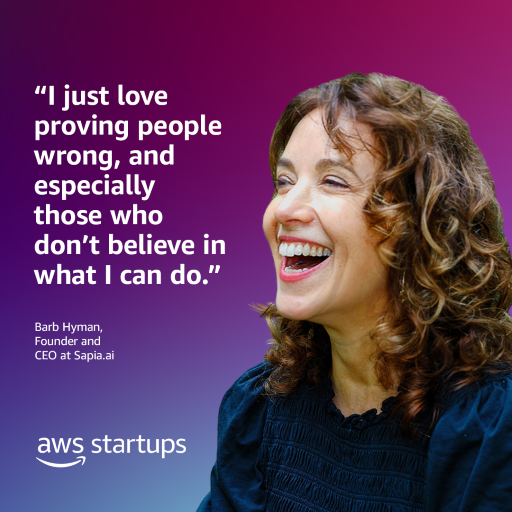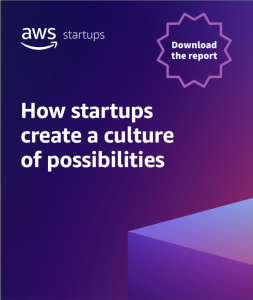How was this content?
Overcoming criticism and imposter syndrome as a startup founder
When you think of startup culture, stories of meteoric successes leap to mind. But for every high-flying unicorn, you may be reminded of the risks and failures also associated with startup culture. Founders know that with success comes detractors, but how can you manage your own self-confidence and sort criticism from feedback? Identifying, and more importantly, managing your approach to criticism is key in maintaining positive mindsets and positive culture within a startup.
According to new research commissioned by AWS, “tall poppy syndrome” — a cultural attitude that disapproves of success and seeks to cut down those who stand out — is widespread within the startup ecosystem, with 80% of surveyed startup leaders saying they have experienced it personally. This is particularly true among the new generation of founders; leaders of younger startups are more likely to have experienced tall poppy syndrome than their counterparts, the research shows.
Social media is attributed as being a leading source of criticism driving “tall poppy” feelings, but it can also come from friends, loved ones, and other founders.
“It’s the mother-in-law or the friend or the Instagram post that is constantly questioning whether you have done the right thing,” says Barb Hyman, founder and CEO of the artificial intelligence (AI)-based human resources (HR) and hiring startup Sapia.ai.
Such criticism can stifle a startup’s growth. Nearly all startup leaders who have experienced tall poppy syndrome believe it hinders growth potential, with 46% saying it has caused them to be more risk-averse, 45% saying it has hindered career development, and 43% saying it has caused their mental and emotional well being to deteriorate.
The result: founders are reluctant to declare themselves to be successful; they would rather keep the focus on the success of their teams.
Barb also says that founders should stay true to their vision in the face of such criticism and remind themselves that what they are doing is important.

“I just love proving people wrong, and especially those who don’t believe in what I can do,” says Barb. “Every day I feel like I am learning, and helping, and ideating. What we are doing is disrupting the whole way we think about people, so it is fundamentally creative, and we are solving so many things because of that.”
And sometimes the loudest detractor in the room? You. Imposter syndrome, or the feeling that accomplishments are the product of luck over ability, is common to most founders — three-quarters of startup leaders say they experience feelings of imposter syndrome, with one in eight feeling it daily. But it’s something that can be managed, experts say.
More than one in four startup leaders we talked to say they manage imposter syndrome in positive ways by focusing on building resilience, celebrating success or cultivating self-compassion.
“I typically manage imposter syndrome feelings by speaking openly with my team,” says Dr. Ben Hurst, founder and CEO of the patient engagement platform HotDoc. “I believe it’s important not to set unrealistic expectations regarding my own capabilities. I am just as fallible as everyone else, trying my best and doing a lot of this stuff for the first time and hoping to improve myself by learning from my team.”
Not addressing feelings of imposter syndrome can have more detrimental effects. 21% of startup founders admitted to working until burnout, and 19% say they would like additional help in managing these feelings.
Hurst says that founders shouldn’t be afraid to be open and honest with their teams about what they are able to achieve, however. “Our core values are always to be empathetic, take ownership, and speak up, and those were architected based on what makes for a successful doctor/patient relationship,” Hurst says. “The most important thing is authenticity and ‘show, don’t tell.’ If I preach these values and am not seen to uphold them, then suddenly it all comes crashing down.”

The takeaway? The journey to founding your startup may feel lonely, but you aren’t alone. Sharing your feelings and celebrating your successes, no matter how small can help you cultivate the self-compassion needed to weather criticism and doubt. AWS knows the right team and support network can make all the difference, which is why we have helped more startups build, scale, and succeed than any other cloud provider.
Check out the rest of the research and insights in the report, “How startups create a culture of possibilities,” to learn from established founders about what it takes to create a culture for success and the key factors and considerations that have made the difference as they’ve grown.

Hannah Wall
Hannah Wall is the Head of Startups Content Marketing. She has 15+ years of experience leading top-performing, large-scale campaigns that drive customer engagement. As a customer-obsessed marketer and behavioral scientist, she’s dedicated to strategic, supportive, and effective communication that creates meaningful dialogue between companies and their customers, and driven to create simple user experiences that drive revenue and reduce customer contacts.
How was this content?